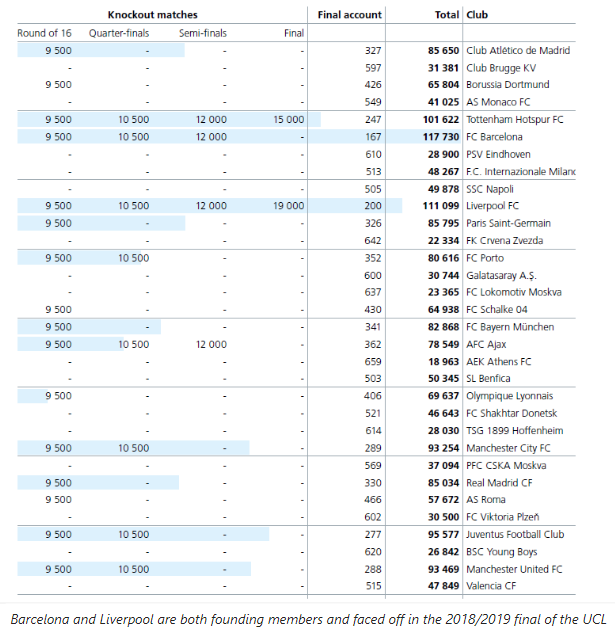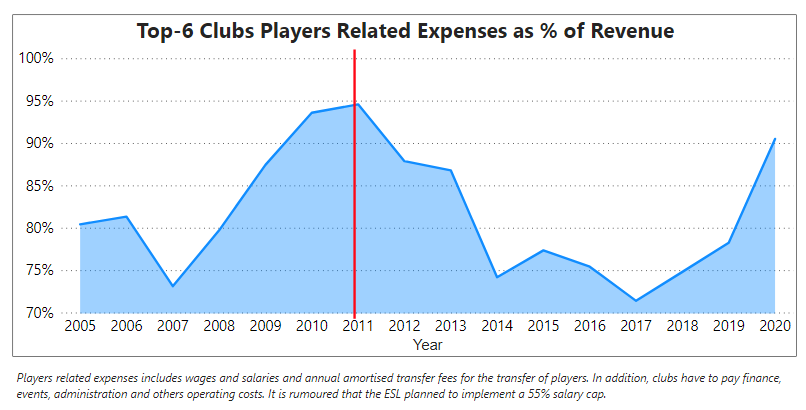European football witnessed a cold war between UEFA and the European Super League (ESL) for two days. The announcement of the ESL by the 12 founding members (pejoratively dubbed "The Dirty Dozen") is an ideological afront on everything UEFA stands for. Though it seems pyrrhic, UEFA has won for now, at least.
On Monday, I was asked, "Where do you stand on the Nigerian Government (FGN) banning things to protect our economy?" The current FGN regularly imposes restrictions that significantly strain the nation's resources without immediate corresponding benefits. This question is important because the objective or goal should determine the policies and decision-making. My response was, "I'm against protectionism, especially when the math doesn't add up. For example, suppose local production capacity cannot meet local demand (not to mention exports) at a competitive price. In that case, banning [the items] does not make economic sense".
UEFA reiterated that the ESL is a coup that would destroy football. Hence, they are prepared to protect the game at all costs. In this piece, I'd discuss the objective of football clubs, UEFA's regulations, the ESL's plans, and next steps for European football.
The objectives of a football club
Generally, a company's objective is profit-maximisation, and its decisions and actions reflect this desired objective. It isn't accurate to ascribe profit-maximisation to European football clubs because, historically, few clubs have made a profit. For example, in 2010, European football clubs reported a combined loss of €1.6bn. Peter Sloane's (1971) utility-maximisation framework is more appropriate for understanding the objective of (European) football clubs. Utility-maximisation is the satisfaction derived from consumption. Psychic income (non-monetary) is more important than profit.
discussions at shareholders' meetings tend to centre on football rather than financial performance, unless, of course, the financial situation is so serious that remedial action is required. Thus, where conflicts arise, they will result from the fact that insufficient finance is forthcoming to maintain playing performance at an acceptable level rather than from a clash over objectives (Peter Sloane, 1971. Pg.132)
Peter's statement suggests that fans (customers), players and managers (assets), and shareholders are all consumers of the product (footballing success). As the saying goes, "Never get high on your supply." At least if profit is the objective. Despite the successive losses, football clubs survive because of loans from banks or investments from wealthy owners. Banks are now less willing to provide financing to clubs; however, billionaires see elite clubs as shinny objects and status symbols.
UEFA's Financial Fair Play (FFP): Unintended precursor for the ideological war?
UEFA implemented FFP in 2011 to encourage clubs to "live within their means" and attain profitability. The intention of FFP is for clubs to limit losses to €5m over three years. In calculating the financial results, FFP stipulates that only revenue from football activities (ticket sales, sponsorship, and TV rights) is permissible. Failure to comply attracts economic and sporting sanctions; however, UEFA allows owners to cover losses to the tune of €30m (over three years) through equity contributions. Sequel to FFP's implementation, losses have progressively reduced, with a few clubs breaking even and reporting profits.
Profit-oriented investors must have said Voila! Because FFP, the emergence of streaming services, and increased demand for European football in Asia and Africa, presented a good business case. What followed was series of takeovers, especially from American owners. In my opinion, these takeovers were the first signs of the impending war. American owners are not in any way evil. They are just accustomed to a different system. Sporting entities on the other side of the pond are designed to make profits. The franchise model, a fixed number of teams (no relegation or promotion), and salary caps, which are alien to European football, are prevalent in American sports. Three of the five executives of the ESL are Americans who own sports clubs in their home country.
UEFA's revenue distribution model
Like European football clubs, UEFA is equally a loss-making entity, except in years when it hosts the Euros (once every four years). The Euros are an international competition, similar to the World Cup but for countries in Europe. On average, UEFA distributes 75% of revenue generated from its competitions to participating clubs. The rest is spent on administration, organisation of events, and payments to national football associations. Distribution to clubs that participate in its club competitions is based on:
Performance: The club's progress in the UEFA Champions League (UCL) or UEFA Europa League (UEL) competition,
Market pool: The coefficient (UEFA's ranking) of the club's country,
Starting fee: All participating clubs receive a fixed amount,
and club coefficient: UEFA's ranking determined by ten years historical performance of the club.
By their own admission, the ESL is not satisfied with UEFA's distribution model and believes the smaller clubs do not contribute as much entertainment value. The founding members projected that the revenue generated from playing 377 in the ESL (20 clubs) would exceed 506 games in UCL and UEL (80 clubs). They could not be more accurate. Though his tone was condescending, Florentino Perez is right. Broadcasters and fans would pay more for Barcelona vs. Manchester United than a game between an ESL and non-ESL team.
UEFA distributes revenue to at least 230 clubs in the pyramid, with the smallest club earning at least €200,000 and the eventual competition winner earning north of €110m. The ESL also planned to share the revenue with the entire football pyramid. However, they did not disclose the distribution model. Nonetheless, the 15 founding clubs would have received the lion's share. In perpetuity. Regardless of performance.
The founding members almost always qualify for the UCL or UEL, anyway. It is their progress in these competitions that is not guaranteed. The uncertainty for the clubs whose presence is most valued – the viewership statistics give credence to this – gave birth to the ESL. Profit-seeking investors hate uncertainty. It is that simple.
Reactions from the football community
I believe the footballing world is opposed to the idea of an ESL for two reasons. Firstly, profit-motive at the board level is alien to football stakeholders. Jan Lehmann, Director at Mainz 05 believes German clubs refused the ESL invitation because their boards do not have "majority investors whose primary aim is to make a profit". Social media was also awash with "created by the poor, stolen by the rich" banners by fans and players.
Secondly, merit in European football is conferred annually. If a club does not earn the right to play in a competition in the current season, they would either be "relegated" in the domestic league or miss out on the next UEFA competition. Arsenal, Manchester City, Tottenham (AMT) are yet to win the current version of the UCL or UEL. Ajax, Porto, Borussia Dortmund have won UEFA competitions. However, they were excluded because their global fanbase is not as significant as AMT's. Ander Herrera highlights a player's dream of competing with the best and fan's illusions ( I think he meant dream) of having their local team compete against the best.
Final thoughts
The events witnessed between Sunday and Tuesday indicate a disconnect and absence of goal congruence among stakeholders. As financiers and ultimately the risk-bearers, the ESL were within their rights to seek a new model that protects their investment. Especially because fans demand success and competitive football, which requires the purchase of the best players.
However, European football is a different terrain, and fans, players, and managers do not appreciate unilateral decisions. Nonetheless, the football community needs to answer several questions. Does European football need a regulator? Are profit-seeking investors welcome? What level of profit is acceptable? Are fans willing to pay more for their beloved sport? The existing model is only sustainable if wealthy owners subsidise the excess costs or fans pay more for football. Time will tell whether ESL will become a reality in the future. However, the message has been loud and clear from the fans, owners (ESL and non-ESL supporters), players and UEFA.










